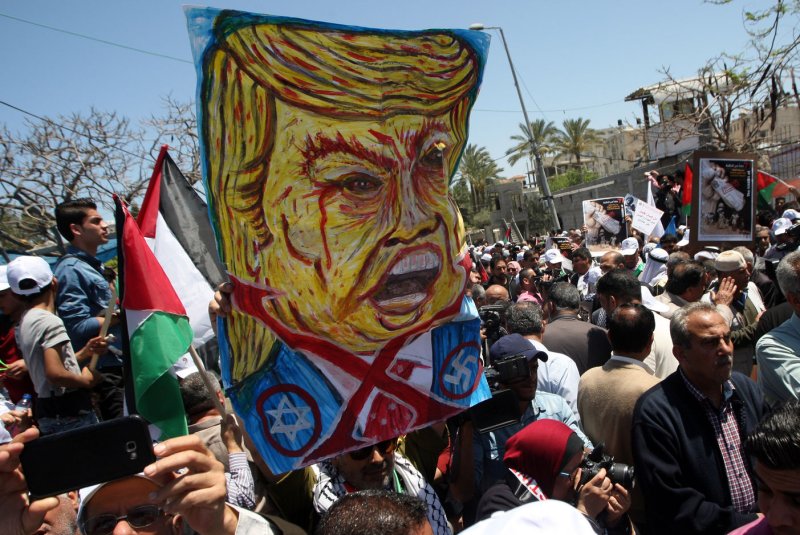Palestinian protesters rally against U.S. President Donald Trump on the 71st anniversary of the "Nakba" in Gaza City on May 14. "Nakba" means "catastrophe" in Arabic, a reference to the birth of Israel in 1948. Photo by Ismael Mohamad/ UPI |
License Photo
May 20 (UPI) -- The Trump administration has announced the first step of what it considers a blueprint for peace between Israelis and Palestinians, encouraging fiscal investment in exchange for a cease-fire.
The administration said Sunday a "Peace to Prosperity" workshop is set for next month in Manama, Bahrain, where government, business and civil leaders will meet to discuss potential economic investments and initiatives for Palestinians. The plan focuses on infrastructure, industry, empowering and investing in people and reforming the Palestinian government.
"Peace to Prosperity will facilitate discussions on an ambitious, achievable vision and framework for a prosperous future for the Palestinian people and the region," the White House said in a statement.
"This workshop is a pivotal opportunity to convene government, civil society, and business leaders to share ideas, discuss strategies, and galvanize support for potential economic investments and initiatives that could be made possible by a peace agreement."
President Donald Trump has called the peace plan the "deal of the century" -- but so far, it appears the proposal isn't stirring much optimism among Palestinians, who expect the plan will heavil favors Israel.
"Any plan without a political horizon will not lead to peace," Nabil Abu Rdeneh, spokesman for Palestinian President Mahmoud Abbas, said Monday.
"All efforts to make the oppressor and the oppressed coexist are doomed to fail," Saeb Erekat, a senior Palestinian diplomat and negotiator, said. "This is not about improving living conditions under occupation but about reaching Palestine's full potential by ending the Israeli occupation."
"The Cabinet wasn't consulted about the reported workshop, neither over the content, nor the outcome or timing," Palestinian Prime Minister Mohammad Shtayyeh added.
Some Palestinians say the U.S. plan is all economic with no political framework. They want a two-state solution with East Jerusalem as their capital and the right for refugees and descendants to return to their land prior to the creation of Israel in 1948.
White House senior adviser Jared Kushner has not yet sad whether the plan addresses a two-state solution.
"Economic progress can only be achieved with a solid economic vision and if the core political issues are resolved," Kushner said in a statement. "We look forward to presenting our vision on ways to bridge the core political issues very soon. The Palestinian people, along with all people in the Middle East, deserve a future with dignity and the opportunity to better their lives."
U.S. presidents have attempted for decades to resolve the Israeli-Palestinian conflict. Trump's efforts are being met with heavy skepticism, mostly because of his clear support for Israel since taking office -- which includes moving the U.S. Embassy from Tel Aviv to the holy and disputed city of Jerusalem a year ago. Trump has also closed the Palestinian diplomatic mission in Washington and cut off funding for the United Nations agency that helps Palestinian refugees in the West Bank and Gaza. Funding for area hospitals was also cut.
Last week, Middle East envoy Jason Greenblatt criticized Palestinian leaders for assailing the peace plan before they knew what's in it.
"It's very frustrating for ordinary Palestinians," Greenblatt said. "They tell me that they understand they may not like aspects of the plan, but are upset that their leaders are saying they don't even take a look at it. I feel terrible for the Palestinian people."
Former Palestinian minister of prisoner affairs Ashraf al-Ajrami said his people won't accept the deal.
"No one can impose a deal on the Palestinians," al-Ajrami said. "I doubt that the Americans will put forward the so-called Deal of the Century because there is no Palestinian or Arab acceptance of this deal. It will be born dead."















